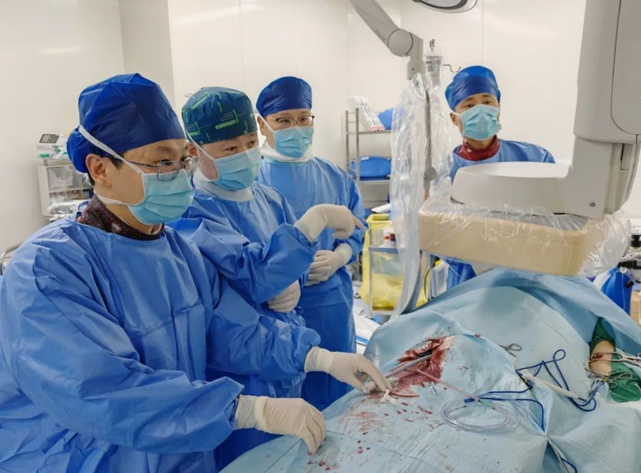- News
The First Emergency Transjugular Intrahepatic Portosystemic Shunt Operation Completed at the Shanghai General Hospital Opens up a “New Path” for Treating Acute and Critical Cases of Liver Cirrhosis with Massive Bleeding
市一医院完成首例急诊经颈静脉肝内门体分流术,打通肝硬化大出血急危重症救治“新通道”
The classic first-line treatment for patients with liver cirrhosis and upper gastrointestinal bleeding is endoscopic hemostasis. For some critically ill patients who are unresponsive to endoscopic hemostasis, transjugular intrahepatic portosystemic shunt (TIPS) provides a lifeline. Prior to this, the team led by Feng Rui, director of the Interventional Center at Shanghai General Hospital, has been conducting elective TIPS treatments for over two years, and the technology has gradually matured. However, the difficulty of implementing this technique in emergency treatment remains significant.
Recently, the team led by Feng Rui, director of the Interventional Center and Vascular Surgery (South) Department at Shanghai General Hospital, successfully completed the hospital's first emergency TIPS surgery, successfully rescuing a patient with "liver cirrhosis with esophageal and gastric variceal bleeding." This opens a new life channel for the treatment of acute and critical conditions such as massive bleeding caused by liver cirrhosis.

Mr. Liu, 50 years old this year, has been suffering from cirrhosis of the liver for many years. One night in mid-May, Mr. Liu suddenly experienced upper gastrointestinal hemorrhage, vomiting a large amount of blood and passing bloody stool in a short time. He was urgently sent to the emergency room of the Songjiang campus of Shanghai General Hospital by his family.
At the time of admission, the patient's vital signs were extremely unstable, and his life was in imminent danger. The Department of Emergency and Critical Care and Gastroenterology immediately performed emergency treatments including endoscopic ligation, hemostasis by triple lumen balloon tube compression, tracheal intubation with ventilator-assisted breathing, and intravenous blood transfusion. After the patient's vital signs stabilized, he was transferred to the ICU for further treatment.
However, these emergency measures could only alleviate the bleeding but not fundamentally address the root causes of portal hypertension and gastrointestinal bleeding, and the patient was still at risk of recurrent hemorrhage. Based on Mr. Liu's condition, experts from the Intervention Center, Department of Emergency and Critical Care, Gastroenterology, and other disciplines discussed the case repeatedly overnight. After thorough communication with the patient's family, they decided to perform the TIPS surgery to address the root cause of bleeding.
On the second day after admission to the ICU, the patient again experienced massive bloody stool, and his hemoglobin continued to decline. Under the guidance of Feng Rui, Wang Zhengyu, the chief physician of Vascular Surgery (South), along with Leng Yuxiu and Wang Xinyu from the Catheterization Laboratory, and Li Jianyun and Wu Huihui from the Anesthesiology Department, performed emergency TIPS treatment on the patient. The surgical team implanted a stent between the patient's right hepatic vein and the left branch of the portal vein through jugular vein puncture to reduce portal hypertension. At the same time, embolization treatment was performed on the bleeding esophageal and gastric varices. The surgery was very successful and completed in just one hour.
After the surgery, the emergency critical care department continued to provide internal medicine hemostatic treatment, while the gastroenterology department performed a gastroscopy to band the patient's residual bleeding gastric fundus veins. Through a series of treatments, the patient's hematemesis and bloody stool gradually stopped, portal hypertension decreased, hemoglobin levels continued to rise, and the recovery was good. The patient has now recovered and been discharged from the hospital.
According to reports, portal hypertension caused by liver cirrhosis is one of the significant causes of upper gastrointestinal bleeding, especially when esophageal and gastric fundus varices rupture. Due to the thin venous wall, once ruptured, it can lead to sudden massive bleeding. TIPS is an effective interventional technique for treating "portal hypertension complicated with esophageal and gastric fundus variceal bleeding" and "refractory ascites." It has the advantages of less trauma, fewer complications, and higher success rates, especially suitable for cases where the hemostatic effect of endoscopic banding is not significant. In the future, the Shanghai General Hospital will routinely carry out emergency TIPS treatment to provide better life support for patients with upper gastrointestinal bleeding due to liver cirrhosis.
